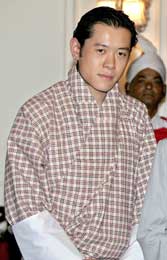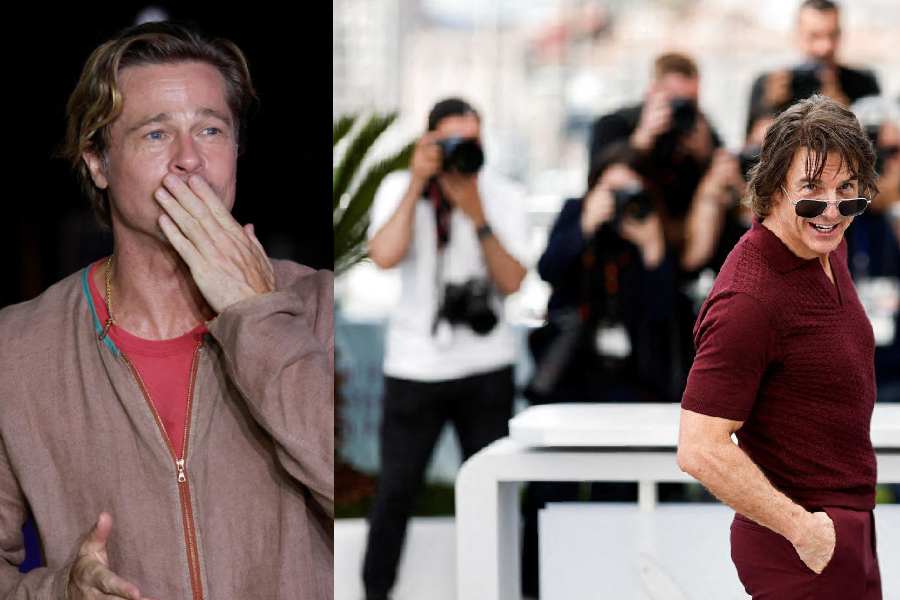|
|
| Jigme Khesar Namgyal |
It was Kalimpong’s flamboyant and enigmatic European Kazini who mentioned Dawa Tsering, screaming “He’s pure Chinese!” When Lyonpo Dawa (the inseparable prefix meant minister in Dzongkha, Bhutan’s language of the dzong) invited me to breakfast in Thimphu soon afterwards, he looked, if anything, a trifle Polynesian. But Kazini always spun her fantasies around a grain of truth, and Dawa told me years later, by when we were friends, that his Bhutia grandmother in Kalimpong had had a liaison with a Chinese.
His is one of three deaths to afflict the dragon kingdom in recent times. Two of the deceased were brothers of the queen-mother, the serene Ashi Kesang Wangchuck, who has seen and suffered much. Ugyen Dorje, soft-spoken and gentle, was recognized as an incarnate lama, whence his incongruous nickname, Rimp, short for Rimpoche. Their other brother, swashbuckling Lendhup, Lennie to some and Lumpy to others, merits a footnote in Bhutan’s political history.
Dawa’s was the biggest role but even that does not mean his passing will provoke a cataclysmic reaction, for he withdrew from public life in 1998. But he was a link between medievalism and modernity in an unsettled region wedged between Asia’s two giants. Jigme Dorji Wangchuck, the third Druk Gyalpo, appointed him foreign minister — Bhutan’s first — in 1970. He held the post for 28 years. Dawa’s loyal backroom support for the next monarch, King Jigme Singye Wangchuck, who abdicated recently, helped to steer an increasingly confident Bhutan through several Himalayan storms into tranquil international waters.
All along he was a good friend of India’s. “Bhutan is India’s only steadfast friend in the subcontinent,” he said. The friction that periodically disrupted relations with Nepal, Bangladesh and Sri Lanka and marred Indo-Pakistani ties was totally absent from the bilateral relationship. Bhutan could vote against India at the United Nations on Cambodia or decline to let some of its rivers be harnessed for hydro-electricity without jeopardising goodwill.
Dawa cut a dashing figure at the UN in the sartorial splendour of orange handwoven kho, flowing red scarf of office, long hose and sword in silver scabbard. He is remembered there as the world’s longest-serving foreign minister who declared on the world body’s 50th anniversary that despite allegations of inefficiency, wastefulness and corruption, the UN was indispensable for small and vulnerable countries like Bhutan.
With a new monarch, a new constitution, novel plans for elections and a new Centre for Bhutan Studies, among other ambitious innovations, the kingdom is rapidly acquiring a 21st century identity. Tourists from afar fly into Paro and go to ground in boutique hotels whose suites have dispensed with telephones to ensure privacy. The entire kingdom is a smoke-free zone. Experts are seeking an index to calculate the idealistic currency of Gross National Happiness in which Bhutan measures its wealth. Amidst so much sophistication, does anyone any longer draw chhang through a bamboo pipe from a hollowed out wooden thumba? Are gurgling mountain rivers packed with trout? Is pork still blazingly seasoned with chilli and packed with rice in round baskets that disappear into the kho’s cavernous folds?
Bhutan’s monarchy remains unique. Sikkim was robbed of its king. Having shorn its sovereign of divinity, Nepal is planning to get rid of the man. But the Bhutanese proudly flaunt two kings — father and son. It must be a little confusing even in court circles where they refer with affectionate irreverence to the fourth and fifth monarchs as K4 and K5. Young and erudite King Jigme Khesar Namgyal Wangchuck, K5, is Bangkok’s pin-up boy. Some suggest that Thais would rather have him than their own crown prince. Others attribute his popularity to what they call his mastery of Asian courtesies like greeting people with a namaste. He was the star guest among all the crowned heads at the 60th anniversary junketing of King Bhumibol Adulyadej’s coronation. His folded hands, slight bow, shy smile and deferential ways won over the Thais much more than the kiss Queen Sophia of Spain planted on the cheeks of her royal hosts.
Dawa would have been a stranger in this glittering cosmopolitan setting though he was a regular visitor to Bangkok, both for medical purposes and because he had a daughter there. Equally, he was a stranger in the old world of dashing dzongdas and dzongkhags in the majestic dzongs that dominate the Bhutan countryside and speak of power in ancient times. His colourful garb was misleading. Clothes that fit K4 like a glove, setting off his athletic figure, could have been fancy dress or obligatory office attire for the stocky foreign minister. Brought up in Kalimpong and educated in Calcutta, Dawa was essentially an urban man. He looked comfortable in grey flannels, polo neck sweater and tweed jacket. The sober attire matched the wisdom and maturity he brought to bear on statecraft.
But he did belong to the past in one sense because it was his feudal allegiance to Jigme Dorje, the queen-mother’s other brother, that first drew him into royal service. Dorje was Bhutan’s all-powerful prime minister who was mysteriously gunned down in Phuntsoling in 1964. The killing plunged the kingdom into turmoil. Jigme Dorji Wangchuck, K3 in today’s terminology, was in Switzerland, and Lendhup proclaimed himself prime minister.
Panic erupted when K3 announced his return. A decade later, K4, choosing his words with care though still only a boy, called the crisis a “political misunderstanding”. But its effects seemed drastic at the time. The ascendant star was Yangki, K3’s close Tibetan friend, to whom India even accorded semi-royal honours. K4’s own fate and that of his mother were said to be hanging in the balance. Lendhup and his other sister, the forceful Tashi Dorje, fled to Nepal. So did hordes of people who were connected in some way with the Dorjes. “Why did you go away?” I asked Nado Rinchen, then an education officer and later a diplomat. “Because everyone went,” was his simple answer.
Alone among all those who had been recruited by Jigme Dorje and served him well, Dawa did not. Predictably, the high rank he rose to under K3 encouraged tales of how he had bought immunity. His imminent downfall was anticipated in 1974 when K4’s consecration — there was no crowning — brought back Lendhup and Tashi Dorje and all the loyal Dorje retainers who had once feared for their safety. The disclosure of a plot to burn down Tashichhodzong, the seat of government in Thimphu, assassinate K4 and replace him on the throne with Yangki’s son prompted her flight to India where she was immediately granted official protection. But Dawa remained Bhutan’s seniormost government leader and the most important (and wealthiest) personage outside royal circles. “He has my trust,” was the king’s terse reply when asked about the foreign minister.
I have known him to be upset only twice. Both occasions were during the 1976 non-aligned summit in Colombo. He burst into petulant protests when I telephoned his hotel room just before midnight: an early riser, he also went to bed early and disliked being woken up. The other episode was more serious. A set of postage stamps commemorating the summit that Bhutan had ordered from an exclusive European firm was delivered in Colombo. One stamp showed a map of the subcontinent. But the entire consignment would have to be destroyed, Dawa wailed. It showed Sikkim as a separate country, divided from India by an international border. I begged for a sheet or even a single stamp as a keepsake, but Dawa wouldn’t hear of it. If word leaked out, it would provoke a diplomatic explosion.
Our last meeting was in Calcutta. He had undergone treatment in Bangkok and was going home. Since Druk Air flies direct from Bangkok to Paro, I asked the ailing Dawa why he hadn’t taken it. “I wanted to see you,” he said.











